Samuel Zulick | |
|---|---|
| Birth name | Samuel Morton Zulick |
| Born | March 1, 1824 |
| Died | June 10, 1876 (aged 52) |
| Battles / wars | American Civil War |
Samuel Morton Zulick (March 1, 1824 - June 10, 1876) was a Union Army officer and medical doctor during the American Civil War.
Zulick's father was a native of Frankfurt am Main while his mother was a native of Philadelphia. His son, Philip S. Zulick, served in the 45th Pennsylvania Infantry Regiment.
On May 15, 1861, he enlisted as private with the 29th Pennsylvania Volunteer Infantry. He was promoted to captain three months later. He was promoted to major after the Battle of Antietam and to lieutenant colonel after the Battle of Chancellorsville. He served at the Battle of Gettysburg and during Sherman's March to the Sea.
On January 13, 1866, President Andrew Johnson nominated Zulick for appointment to the grade of brevet brigadier general of volunteers, to rank from March 13, 1865, for "bravery and efficiency as an officer" and the United States Senate confirmed the appointment on March 12, 1866. [1]
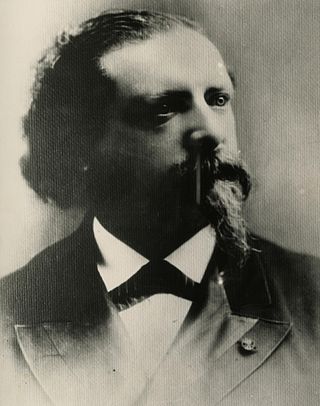
Edward Selig Salomon was a German-American politician and military official. Born into a Jewish family in the Duchy of Schleswig in modern-day Germany, he immigrated to the United States as a young adult and served as a lieutenant colonel for the Union during the American Civil War. After nomination for appointment to the grade of brevet brigadier general of volunteers to rank from March 13, 1865, by President Andrew Johnson on January 13, 1866, the United States Senate confirmed the appointment on March 12, 1866. Salomon later held public office as Cook County (Illinois) clerk, governor of Washington Territory and a California legislator.
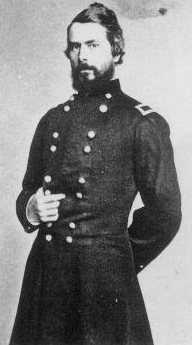
Truman Seymour was a career soldier and an accomplished painter. He served in the Union Army during the American Civil War, rising to the rank of major general. He was present at the Battle of Fort Sumter. He commanded the Union troops at the Battle of Olustee, the only major Civil War battle fought in Florida.

John Irvin Gregg was a career U.S. Army officer. He fought in the Mexican–American War and during the American Civil War as a colonel and near the end of the war as a brevet general in the Union army. In 1866, he was nominated and confirmed as a brevet major general of volunteers and a brevet brigadier general in the Regular Army, both to rank from March 13, 1865.

Robert Christie Buchanan was an American military officer who served in the Mexican–American War and then was a colonel in the Union Army during the American Civil War. In 1866, he was nominated and confirmed for appointment to the grades of brevet brigadier general and major general in the Regular Army for valor in several battles, to rank from March 13, 1865. In a career that spanned more than forty years, Buchanan held numerous commands and received multiple citations for bravery and distinguished service.
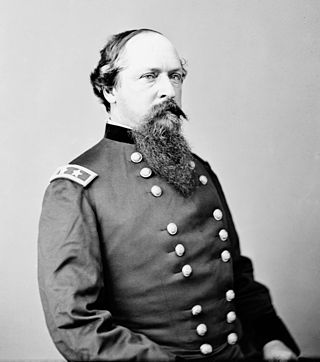
James Brewerton Ricketts was a career officer in the United States Army, serving as a Union Army general during the Civil War.
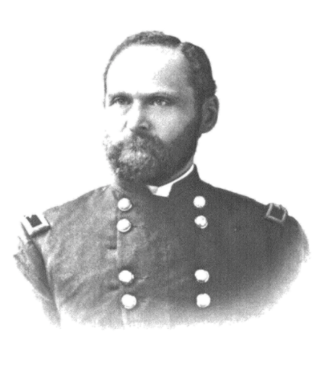
Aaron Simon Daggett was a career United States Army officer. He was the last surviving brevet Union general of the American Civil War, and the last surviving general of any grade from the war, when he died exactly one month shy of his 101st birthday in 1938. Daggett was nominated for appointment to the grade of brevet brigadier general, to rank from March 13, 1865, by President Andrew Johnson on February 21, 1866 and was confirmed by the United States Senate on April 10, 1866. During the war, Daggett fought at West Point, Gaines' Mill, Golding's Farm, White Oak Swamp, Second Bull Run, South Mountain, Antietam, Rappahannock Station, Fredericksburg, Battle of Gettysburg, Battle of Mine Run, Battle of the Wilderness and Battle of Cold Harbor. Daggett was a brigadier general of volunteers in the Spanish–American War. He was appointed to the brigadier general grade to rank from September 1, 1898 and was mustered out of the volunteers on November 30, 1898. He was promoted to brigadier general in the Regular Army ten days before his retirement from the army on March 2, 1901.

George Childs Burling was a United States Union Army officer during the American Civil War, serving mostly as colonel and commander of the 6th New Jersey Volunteer Infantry. Burling was born in Burlington County, New Jersey, raised on his father's farm and educated at a private school in Norristown, Pennsylvania. He was a coal merchant and a militia officer before the war. Burling's militia company was mustered into the volunteer service for a three-month term in July 1861, but it became company F of the 6th New Jersey with a three-year enlistment on September 9, 1861. Burling became the regiment's major on March 19, 1862, and lieutenant colonel on May 7 of that year. Burling was wounded at the Second Battle of Bull Run in August 1862.
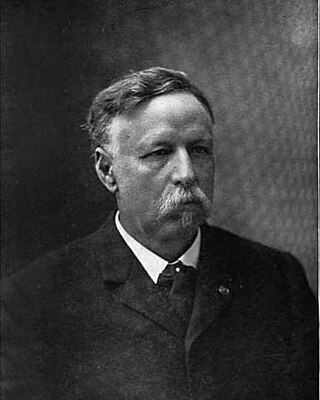
John Peter Shindel Gobin was an American politician from Pennsylvania who served as an officer in the Union Army during the Civil War, as a member of the Pennsylvania State Senate for the 17th district from 1885 to 1898 and as the seventh lieutenant governor of Pennsylvania.

Absalom Baird was a career United States Army officer who distinguished himself as a Union Army general in the American Civil War. Baird received the Medal of Honor for his military actions.

Henry Blackstone Banning was a lawyer and three-term U.S. Representative from Ohio, as well as an infantry officer in the Union Army during the American Civil War.

Elliott Warren Rice was a general in the Union Army during the American Civil War. He commanded an infantry brigade during the pivotal Atlanta Campaign in the summer of 1864.

Samuel Beatty was an American soldier, sheriff, and farmer from Ohio. He was a brigadier general in the Union Army during the American Civil War. In 1866, he was awarded the brevet grade of major general of volunteers.
Samuel Perkins Spear was an American soldier who saw combat in the Seminole Wars, the Mexican–American War, and the Civil War.
Joseph Conrad was a Union American Civil War colonel who was nominated and confirmed in 1866 for appointment as a brevet brigadier general of volunteers for his service during the Atlanta Campaign.
George Zinn was a Union Army officer during the American Civil War. President Andrew Johnson nominated him on January 13, 1866 for appointment to the grade of brevet brigadier general of volunteers, to rank from April 6, 1865, and the United States Senate confirmed the appointment on March 12, 1866.
William H. Blair was a Union Army captain and company commander in the 51st Pennsylvania Volunteer Infantry Regiment, and a colonel and commander of the 179th Pennsylvania Volunteer Infantry Regiment during the American Civil War. After his service, he was appointed to the grade of Brevet brigadier general in recognition of his service at the Battle of Antietam.

Charles Henry Tucker "Tucky" Collis was an Irish-American US Army officer who received the Medal of Honor for his actions in the American Civil War.
Samuel King Vaughan was an American businessman and Wisconsin pioneer. He served as a Union Army officer throughout the American Civil War and was granted an honorary brevet to brigadier general. After the war, he served a term as sheriff of Columbia County, Wisconsin.
Orpheus Saeger Woodward was a Union Army officer during American Civil War.
William Tecumseh Wilson was a Union Army officer during the American Civil War.